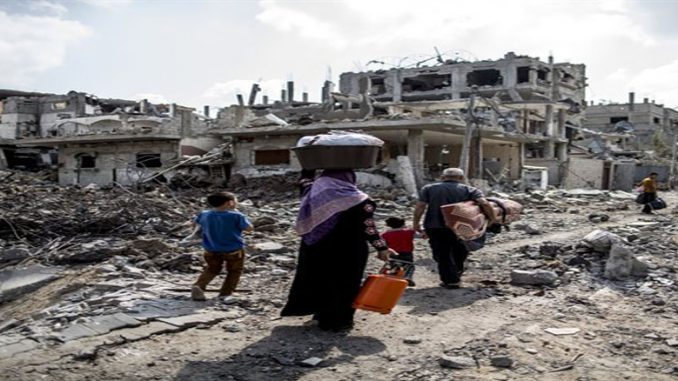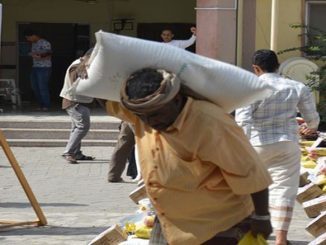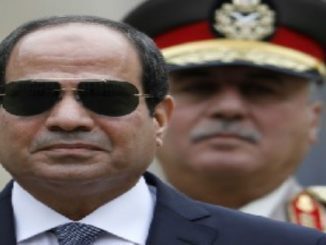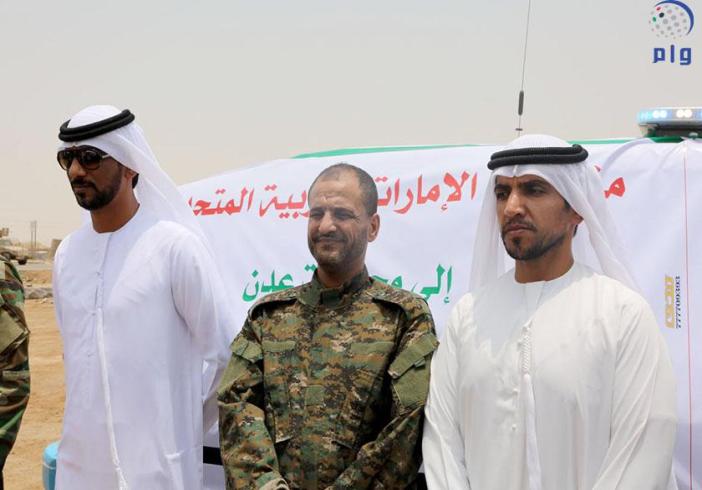
The embargo against Qatar has greatly benefited Israel, as Tel-Aviv’s priority is to end the resistance in Gaza. Israel has gained significantly from the Qatar crisis by deepening the separation between Arab countries, diverting attention from the Palestinian issue as it increases persecution of Palestinians and shaking the last points of resistance against its oppression.
For many years, Israel has tried to put organizations such as the Muslim Brotherhood Movement and Hamas, which have a bond with the locals, on a terror list. When the United Arab Emirates (UAE), Saudi Arabia, Bahrain, and Egypt accused Qatar of “supporting terrorism,” Israel found an opportunity to fulfill its own aims.
Israel benefits from the Qatar crisis
Experts have said that as a result of the political and economic blockade of Qatar, Israel is expected to accuse Hamas of being linked to terror and cause the withdrawal of aid for Gaza in an attempt to cause despair and weaken resistance in the Arab world. The UAE, Saudi Arabia, Bahrain and Egyptian governments jointly signed terror list that mostly includes non-governmental organizations that send aid to Syria and Gaza. It was stated that the list was prepared by Israel and shared with the countries who signed it.
Moreover, the Tel-Aviv administration wrote a letter to the United Nations Security Council for Hamas to be considered a terrorist organization. Israeli Prime Minister Binyamin Netanyahu wants the United Nations to close the UN Palestinian Refugee Assistance and Work Organization (UNRWA) in an attempt to benefit from the crisis.
Hamas is resistance, not terrorism
However, social media have fired back following recent statements by Saudi Foreign Minister Adel al-Jubeir characterizing Hamas as a ‘terrorist organisztion’.
Adel al-Jubeir’s remarks came as part of the rift between Qatar, Saudi Arabia, the United Arab Emirates and Bahrain. On June 5, Saudi Arabia, the UAE, and Bahrain announced they were cutting diplomatic ties with Qatar for its support for “terrorism”, an allegation that Qatar has repeatedly denied.
Israeli defense minister last year threatened of ‘completely destroying Hamas’
Israel’s Defence Minister Avigdor Lieberman said last year in an interview that any future hostilities between Israel and Hamas in the Gaza Strip will be the last, “because we will completely destroy them”.
Lieberman made the comments in a rare “hearts and minds” interview with Jerusalem-based Palestinian newspaper al-Quds, published on Oct. 24, 2016, in which he insisted that all Palestinians have a duty to deter the Hamas movement from what he called its goal of destroying the Israeli state.
War on Gaza, a matter of time
There is a conviction to many Palestinians when asked about the possibility of a new war on the Gaza Strip that “It’s just a matter of time, no more, pending further escalation.
Salah Abd El-Ati, the director of the Palestinian Center for Policy Research and Strategic Studies, described a missile attack on Gaza last year (more than 60 Israeli raids) as a “foreshadowing of a real war that will bring more disasters because of what the Strip is suffering from exceptional circumstances caused by three wars in less than 5 years over 10 years.”
Abd El-Ati explained the size of the human and material losses that he expects in the case of the outbreak of a new war on Gaza, saying: “The poverty rate in the Gaza Strip is 65%, the unemployment rate is 47%, and there is a real tragedy related to the bad humanitarian conditions and the slow access of the construction materials to Gaza. Therefore, the Palestinian citizens fear that Israel might launch a new aggression, in exploitation of the regional conditions that the world is preoccupied with.”
While Abd El-Ati expects that the next war on Gaza will be “disastrous”, he believes that Israel is seeking to impose the equation of “calm for calm” or “calm for humanitarian facilities”, hoping to take advantage of that situation as an occupation authority. Salah Abd El-Ati also said: “The occupation authorities do what they want, and because Israel has not yet been held accountable, we see what it is doing in the West Bank of cold-blood executions, and the expansion of settlements, as well as the continuing Judaization of Jerusalem. Therefore, there is a real fear, and the citizens have every right to fear from any coming aggression, especially in the absence of a serious prospect of a Palestinian reconciliation that could at least lead to masterminding the decision of peace and war within the Palestinian community.”
Palestinians have failed to formulate a combative strategy or a collective leadership
“The leaders of the Palestinian factions do not seek war, and they are fully aware of the serious humanitarian situation, but in the event of the imposition of war by the Israeli enemy, those leaders will not stand by and watch, but they will defend with all their strength, which is its right according to the international law,” said Salah Abd El-Ati. He also stressed that under the current circumstances, there is no need for any possible aggression, as the balance of power does not allow the Palestinians to make breakthroughs, and therefore they have to avoid further losses.
Abd El-Ati also stressed that the status of the West Bank is linked to the developments in the region, because of the Palestinians’ insistence on making their cause dependent on the issues of others, in addition to their failure to formulate a combative strategy or a collective leadership.
Abd El-Ati put a number of scenarios for the future of the situation in the Gaza Strip, pointing out that the best of these scenarios is the “achievement of a Palestinian reconciliation to rebuild the Palestinian political system, and avoid the risk of aggression, the continuation of the siege, and the slow pace of reconstruction mechanism.”
“However, there are also scenarios for imposing an aggression on the Gaza Strip in order to create a statelet in the Strip, or, a truce that could lead to the opening of a seaport in Gaza, and thereby assisting in the displacement of people,” Abdel-Ati explained, pointing out that there is a real fear for the future of Gaza and its separation from the West Bank if the current situation continues. He added that the occupation wants this scenario, which some organizations help its acceleration through firing rockets toward Israel without a national consensus on their action.
Political analyst: The two sides are preparing for the war as if it will break out tomorrow
According to Hani Habib, a political analyst, both parties (Hamas and Israel) are preparing for this new war as if it will break out tomorrow, although they reaffirm that they do not want it.
Habib said: “The current situation makes talking about war more expressive than talking about a truce or calm,” adding that “Both parties are calling for avoiding escalation. But at the same time, they are ready, and the war machine still works even in an artificial atmosphere of calm.”
Habib also sees that the next war will not be the last, as it will not constitute an existential threat to any of the parties, pointing out that “The coming war is just the beginning of wars to come, even if a clearer victory is settled for either party. The real victory which can stop wars is the termination of one of the two parties. Although this is not ruled out, however, it is impossible according to the current situation.”
Hamas spokesman: We do not seek war, but we are not afraid of confrontation
Hamas Spokesman Sami Abu Zuhri told the Middle East Observer that “Hamas does not seek war or escalation, but the movement is not afraid of confrontation, and is preparing to defend its people at any time,” pointing out that the Israeli repeated talk about war is meant to achieve several objectives, including affecting the members of the resistance, and pleasing the internal Israeli public, especially after the escalation of criticism of the Israeli government’s performance in the last war on Gaza.
Hamas spokesman did not hide the fact that the Palestinian street is unwilling to engage in a new war, saying: “The street does not want war because of the Israeli criminality and the size of barbarism with which the occupation army deals with the Palestinian people, which made the people interested in following with concern such threats. But, I think that our people trust the resistance.”
Abu Zuhri added: “The last war strengthened the confidence of the Palestinian people in the resistance, created a new equation, and made it difficult for the occupation to wage any aggression or action against Gaza, which is evident through the behavior on the ground.”
Hamas spokesman believes that the region countries are required to form a permanent pressure on the occupation to prevent it from committing any crime in Gaza.
Israeli media warning
The Israeli newspapers and media outlets are relentlessly talking about or warning of a coming war on Gaza on almost a daily basis.
Hebrew Channel 2 has claimed that the next war which Israel will launch on the Gaza Strip will be more “aggressive” than the previous wars. Israeli media also reported that what it called “Israel’s superiority” will be determined by the ground troops’ movement on the ground, and that the occupation army has decided to pay more attention to the ground troops that would be “more effective” in any coming confrontation.
Aouhaa Ofer, the correspondent of the Israeli NRG website, said that the prevailing calm on the border with the Gaza Strip is, possibly, because the Islamic Resistance Movement (Hamas) continues to be affected by the deterrence of the last war in 2014, adding that many Israelis demand waging a “final war” on Gaza.
The Israeli writer confirmed that Hamas is not enthusiastic to enter into a new confrontation with Israel and that this is not due to being affected by deterrence only, but because it is drawing lessons from the previous war. He added that Hamas is also trying to improve its combat system through field exercises, building a network of tunnels, conducting missile tests towards the sea, and planning to carry out armed operations in the West Bank, in preparation for the next war.
Israeli exercises
Maariv has revealed that the Israeli army is conducting training and military exercises to deal with any emergency on both the Gaza Strip and the Golan Heights fronts, including the evacuation of the wounded, and dealing with snipers in the cities. Maariv’s military correspondent, Noam Amir, said that the latest of these exercises were carried out by the security departments of the settlement blocs around the Gaza Strip on the way to evacuate the wounded and injured on the Gaza border.
He pointed out that the military unit continues its training – summer and winter – in preparation for what may face the soldiers in the northern front, where there are armed groups that are involved in the Syrian war and are considered part of the potential threats to Israel.
Could the recent developments in the Gulf affect Hamas’ situation in Gaza?
The director of Al-Quds Center for Political Studies, Oraib al-Rantawi, is one of the most followed daily columnists in the Arab world, especially when it comes to Palestinian affairs. Rantawi, a Jordanian of Palestinian origin, devoted two successive columns on June 8-9 to the effects of the ongoing Gulf drama to the demise of the Palestinian Islamic movement Hamas.
Rantawi made a direct connection in his June 8 column between the escalation against Qatar and the May 20 Arab summit with US President Donald Trump in Riyadh. “Trump lumped Hamas with the Islamic State, Jabhat al-Nusra and Hezbollah in his terrorism list, while attending Arab Islamic leaders were quiet.”
Omar Kullab, a Jordanian political analyst of Gaza origin said that the recent visit to Egypt by the Hamas delegation was not a pleasant one. “Sinwar and his group were summoned to Cairo and were told point-blank that they have to quickly end their rule and hand over the reins of power in the Gaza Strip to the Ramallah-based authority,” reported Al-Monitor.
Rantawi warned Palestinian President Mahmoud Abbas and the Ramallah-based leadership, however, not to get too excited about the developments between Hamas and the Arab world. “I worry that Fatah in Ramallah would welcome these changes and feel good about them. It might be Hamas today, but it could be Abbas tomorrow,” he warned.
Rantawi’s concerns are apparently correct. A PLO source in Ramallah told Al-Monitor on condition of anonymity that the Palestinian leadership is very happy with the latest developments. “They are enjoying seeing Hamas go down, especially because of what Hamas did to them,” he said in reference to Hamas taking over Gaza by force from the Palestinian Authority in 2007. The source insists that without Qatar, Hamas would have “collapsed” a long time ago.
There is no doubt that in the post-Trump visit to Saudi Arabia, a new order has been established.
Gazans worried by Qatari crisis
Aid groups and residents of the Gaza Strip have expressed concern over Qatar’s rift with several Arab countries, which could affect aid to the impoverished region.
Jan Egeland, secretary-general of the Norwegian Refugee Council said on Tuesday that Qatar “has been very important as an investor in Gaza” and as a “contributor to infrastructure projects there.”
He added this might now “not easily continue.”
Qatar is among the biggest contributors of aid to Palestinian territory.
Qatari support comes in the form of humanitarian projects to improve the lives of the two million people of Gaza, which has been under an Israeli-Egyptian blockade.
It has built a housing complex for thousands of families, paved major roads across Gaza, built a hospital and funded the reconstruction of hundreds of houses that were destroyed or damaged during a 50-day war with Israel in 2014.
Now with a crisis looming between Qatar and its Arab neighbours, residents in Gaza expect worse to come.
“If this happens though, and Qatar does withdraw its support, it will severely effect the people of Gaza, especially because Qatar is a huge financier of reconstruction projects after the war and charity work,” Ahmed Rezeq, 25, an entrepreneur told Al Jazeera.
He said that eventually, the people in Gaza will “pay the price” because of the conflict.
Sara Thabit Dogmash, 23, a researcher at the Palestinian Center for Democracy and Conflict Resolution, meanwhile told Al Jazeera that she is confident Qatar will continue to support the residents of Gaza.
“It’s the richest nation in the world, it’s economically and politically strong, there is no domestic opposition. Qatar supports countries and people all over the Arab world.”
Search for Israel!
The choice of June 5 – the anniversary of Israel’s Six Day War, which led to the occupation of East Jerusalem, the whole of the West Bank and the Golan heights – to launch the move against Qatar, the main supporter of the Palestinian cause is a significant indication of Israel’s role in the Gulf rift. Fifty years ago, the countries that were defeated by Israel and dragged into great suffering, this time joined forces with Israel and burdened Qatar.
Israeli Defense Minister Avigdor Lieberman described the diplomatic row as “a great opportunity” for Israel on the first day of the crisis. Lieberman argued that the countries that imposed the blockade on Qatar were in the same position as Israel in the fight against “extreme Islamist terrorism”.
Experts believe that Israel’s quick adaptation is because it hold a similar vision for the region to the countries involved in the spat.
Hamas warning!
However, Musa Abu Merzuk, a member of the Hamas political bureau, has issued a warning to the Arab countries regarding the recent Gulf crisis.
“No one should have differences on the Palestinian issue,” he said.
Merzuk stressed that Hamas will continue to struggle for “the Jerusalem issue and the unity of the Palestinian people.”
In light if the recent Gulf crisis and the controversy about the future of the Palestinian resistance, particularly Hamas and Al-Jihad, will Israel attempt to wage its fourth war against Gaza and ‘terminate’ Hamas, but this time with open support from Arab countries after the isolation of Qatar?



